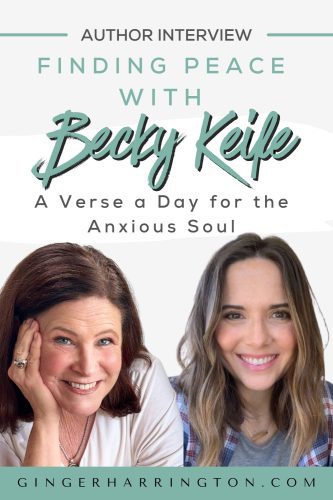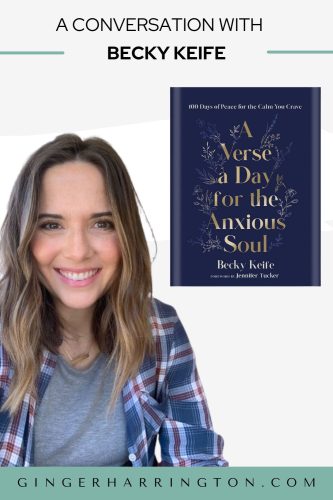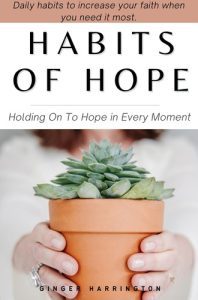What can we learn about finding peace from Becky Keife’s devotional, A Verse a Day for the Anxious Soul?
When faith meets anxiety, it can feel impossible to hold on to peace. In this conversation, author Becky Keife shares how naming anxiety honestly, breathing Scripture through simple “inhale truth / exhale trust” practices, and grounding our hearts in God’s presence can transform fear into deeper dependence.
Some seasons tug harder on our peace than others. Recently, I’ve been reminded that quieting anxious thoughts isn’t about fixing everything—it’s about trusting the One who holds everything. That’s why my conversation with Becky Keife, author of A Verse a Day for the Anxious Soul, resonated so deeply. Her gentle wisdom offers real help for the moments when calm feels out of reach.
Becky Keife is a writer, Bible teacher, and encourager of anxious hearts. Her newest book, A Verse a Day for the Anxious Soul, is a 100-day devotional filled with Scripture, stories, and practical peace practices for weary minds. Together we explored how faith intersects with anxiety, what it means to hear God’s voice in the middle of mental noise, and how peace becomes possible—one verse and one breath at a time.
If you’ve ever wondered whether anxiety disqualifies you from strong faith, or if peace is only for people who “have it all together,” this episode will meet you right where you are. You’ll discover hope, honesty, and habits that invite God’s peace into the everyday rhythms of your life.
Naming Anxiety: Why Words Become a First Step Toward Healing
“If we can’t name it, it feels like we can’t share it. And if we can’t share it, we stay stuck and often spiraling.” —Becky Keife
Those words resonated deeply. When anxious thoughts spin in our heads, perspective narrows and everything feels clouded. Speaking it aloud—to God, to a spouse or trusted friend—or even writing it down “lets the steam out of the pressure cooker,” as Becky put it. She encourages a compassionate reframe: What would I tell my best friend if she felt this way? Most of us are kinder to others than we are to ourselves.
Can Anxiety Be a Gift?
“Anything that heightens our awareness of our desperate need for Jesus is a gift. Anything that draws us into deeper intimacy with the Lord—and expands our compassion for others—is a gift.” —Becky Keife
As an achiever by wiring, Becky confessed that anxiety has become a pathway to dependence—less self-reliance, more God-reliance. I nodded hard here. In my own life, I’ve watched God redeem anxious places by meeting me in them, shaping tenderness for others who struggle. Redemption looks like fruit we couldn’t grow on our own.

Is Anxiety a Lack of Faith? Understanding the Continuum (and Losing the Shame)
Yes, Scripture invites: “Do not be anxious about anything… but in everything by prayer…” (Philippians 4). But as Becky noted, using that verse to shame someone navigating a clinical diagnosis is like telling a person with a thyroid disorder, “Just stop having it.” The Bible’s invitation isn’t a whipping post—it’s a hand extended.
“Shame off. That is not the voice of God.” —Becky Keife
The Spirit convicts; He does not condemn. Jesus cares about the fullness of our person—body, mind, and soul. Faithful response may include prayer, gratitude, counseling, therapy, or medical care. All of those can be grace.
Peace Is a Presence: Meeting Jesus in the Middle
For Becky, practicing God’s presence is both confessional and relational:
- Tell God the truth: “Lord, this is how I’m feeling. This is how I see my situation.”
- Receive God’s truth: “What do You want me to know? What do You want me to do?”
“The problems don’t disappear, but I’m aware I’m not alone. God is right here with me—and then I can take the one next step forward.” —Becky Keife

Learning to Hear God’s Voice (Even on a Busy Tuesday)
- Ask: “Lord, teach me to hear Your voice.”
- Get quiet (even five minutes).
- Open the Word and write unfiltered what comes to mind.
- Test it against Scripture; share with a trusted friend.
She shared a training analogy—learning to recognize your “call sign” like a rookie officer tuning to his number on a busy radio. At first, you may only catch it in silence. With time, you’ll hear it while you drive; eventually, even in the “high-speed chases” of life.
I’ve known that grace too. In a season when everything seemed to be unraveling after a move overseas, I told God, raw and unfiltered, “I feel like You set me up for failure.” What I sensed in return wasn’t my own pep talk: I didn’t set you up to fail. I set you up to grow. The Shepherd’s voice leads—never shames.
Breath Prayers that Calm and Center
One example she shared:
- Inhale truth: “The Lord is my shepherd.” (Ezekiel 34:12)
- Exhale trust: “He will rescue me.”
“Truth is our anchor, but if we don’t apply it, it stays as knowledge. In this moment I can’t control everything, but I can control my breath and fix my thoughts on Jesus.” —Becky Keife
Peace Practice #1: Move Your Body
“When I haven’t moved my body, my anxiety starts to increase. The walk isn’t about performance; it’s a pathway into God’s presence.” —Becky Keife

Come As You Are (Matthew 11:28–30)
“Come to me, all you who are weary and burdened, and I will give you rest… for I am gentle and humble in heart, and you will find rest for your souls.”
Becky hears Christ’s kindness here: Come as you are. He already knows the burdens you carry—grief, overwhelm, insecurity, depression, or anxiety—and He doesn’t say “fix yourself first.” He says, Come. Then: “Learn from me.” We are disciples in process. Whether you’ve memorized Scripture for decades or are opening the Bible for the first time, the invitation stands.
That same gentleness reframes usefulness—especially when anxiety makes us feel disqualified.
“God Can’t Use Me If I’m This Anxious”… or Can He?
“My grace is sufficient for you, for my power is made perfect in weakness.” (2 Corinthians 12:9)
Becky noticed that little preposition: in weakness, not despite it.
“God may not want us to stay spiraling, but right where we’re still in process, He shows up and shows off—so we know it’s Him.” —Becky Keife
Your lived story becomes comfort for others (2 Corinthians 1:3–4). Far from disqualifying you, your healing journey may be precisely the place your ministry is born.
With that hope, Becky shared a glimpse of the devotional’s heart and who it’s written for.
Inside the Book
- A single verse (clear, uncluttered Scripture focus)
- A brief reflection (real life, no gloss)
- A simple peace practice (e.g., breath prayer, movement, noticing)
It’s not fluffy, and it’s not intimidating. It’s a gentle guide into the presence of God—day by day, breath by breath.
“My words don’t change hearts, but God’s presence changes everything. I believe you’ll meet Him in these pages.” —Becky Keife
As we closed, Becky left a word for the one who’s certain their story is too heavy or too late.
For the One Who Wonders if It’s Too Late
“I don’t know if the Lord will fully heal me of anxiety this side of heaven—but I know He uses it to draw me back to His presence every day.” —Becky Keife
Friend, your anxious thoughts don’t scare God. He’s not waiting for you to “get it together”; He’s walking with you in the middle of it. As Becky reminds us, peace isn’t the absence of problems—it’s the presence of Jesus. Today, “inhale truth, exhale trust.” Then take the next right step with your Shepherd.
Resources and Links
- Book: A Verse a Day for the Anxious Soul: 100 Days of Peace for the Calm You Crave by Becky Keife
- Author Website / Social: Connect with Becky for encouragement and updates.
- Podcast Episode: Finding Peace with Becky Keife — listen to the full interview on the Habits of Hope Podcast.
- Related Recommendation: Living Fearless by Jamie Winship (helpful insights on discerning God’s voice).
*This post contains affiliate links at no cost to you.
FAQ
What does the Bible say about anxiety?
Scripture repeatedly pairs “Do not fear” with God’s presence (e.g., Isaiah 41:10; Philippians 4:6–7; Matthew 11:28–30). The invitation is to bring our anxious hearts to Him in prayer and trust.
Is anxiety a sin or a medical issue?
Anxiety exists on a spectrum—from common worry to clinical disorders. Christians can (and should) pray and pursue wise care (therapy/medical support) as needed.
What is a breath prayer?
A simple breathing rhythm paired with Scripture—e.g., Inhale: “The Lord is my Shepherd.” Exhale: “I trust You.” It calms the body and centers the heart on God.
Related Content
The Steady Heart Series
- Part 1: How to Choose Joy in Hard Times: A Study of Philippians 4:4-5
- Part 2: How to Shift from Anxiety to Peace: A Study of Philippians 4:6
- Part 3: How to Find God’s Peace That Guards Your Heart: A Study of Philippians 4:7
- Part 4: How to Filter Your Thoughts and Find Peace: A Study of Philippians 4:8-9


 So glad you're here. I help busy women—gals like you— build healthy habits for living well with biblical wisdom and practical steps to deepen your faith, increase your hope, and thrive in your purpose.
So glad you're here. I help busy women—gals like you— build healthy habits for living well with biblical wisdom and practical steps to deepen your faith, increase your hope, and thrive in your purpose.



